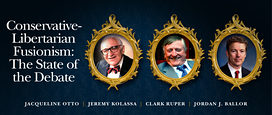Clark Ruper provides an excellent overview of the recent history of fusionism and includes an argument about the historical significance of the opportunity to advance liberty among the young today: “We are witnessing the maturation of the most libertarian generation in recent memory.” Jacque Otto grounds much of her reflection on the Christian moral tradition.
I’d like to juxtapose some of this historical sensibility with a claim Jeremy Kolassa makes in his attempts to distinguish conservatism and libertarianism. Kolassa writes that “libertarianism is about liberty, specifically individual liberty. Conservatism, on the other hand, is about conserving as much of the past as possible, and having as little change as possible. Libertarians are excited about the future and the changes that await us, in technology, society, culture, and in many different fields. Conservatives, on the other hand, just shudder. Libertarians love freedom. Conservatives love tradition.”
What should we make of attempts by libertarians to find some historical grounding for their views? Consider as just one example, Rothbard’s An Austrian Perspective on the History of Economic Thought and specific claims about the seventeenth-century School of Salamanca. And of course Lord Acton has been dubbed the “historian of liberty.”
Are such historical arguments a form of appeal to “tradition” that are by definition (Kolassa’s at least) more conservative than libertarian?

